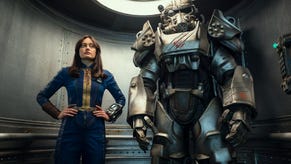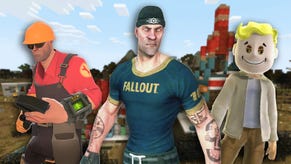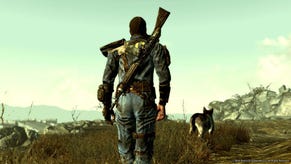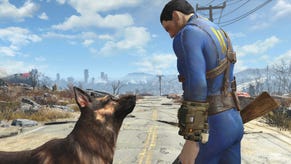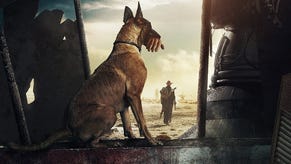Fallout 3
Duck and recover?
In games, as in movies, answers tend to hide behind doors. And they don't get much bigger than the door to Vault 101 at the start of Fallout 3, having kept its nuclear bunker safe from the irradiated remains of good ol' USA for a few hundred years. Early on in Bethesda's game, you'll get to open this door. And what lies beyond? A loading screen.
As Oli's preview mentioned, Fallout 3 is not the most technically impressive game you'll see this year - the load screens that interrupt proceedings when you move between locations can kick in at jarring moments, the story's post-apocalyptic wilderness is often flat and low-res, and in third-person view, your character moves with an unlikely bounce in his step, which, at times, suggests he's trying to keep his spirits up while navigating this ruined wasteland by indulging in a spot of power-walking.
Things get significantly better at night, however, as the starry sky adds a monochrome sense of menace to the location, and even during the day, there are still plenty of nice touches to the design, such as a broken-backed flyover rising into the distant sky, or the discovery of a picket-fence-and-clapboard community, presumably once picture postcard idyllic, and long since shredded by a nuclear blast. Fallout 3 doesn't look terrible by any means, it simply seems disconcertingly inconsistent: the game offers up vast draw distances but has little to fill them with, and presents brilliantly menacing mutated enemies that often clip through the ground when you've killed them.
We've been shown a lot of Fallout 3 recently, but it's tended to focus on the combat, with its uneasy alliance of the super-powered VATS [Vault-tech Assisted Targeting System] allowing you to freeze time and cue-up shots on body parts, multiple enemies, and even grenades that are winging their way through the air towards you, and the slightly awkward real-time FPS mode, which we found we only really wanted to use when we'd been caught entirely unawares, or were backing up rather speedily from an advancing dog. One system's fun and makes you feel powerful, the other's annoying and makes you feel like you're trying to catch a fly with chopsticks in the middle of a coughing fit - it's hard to see how Bethesda are going to square this circle.
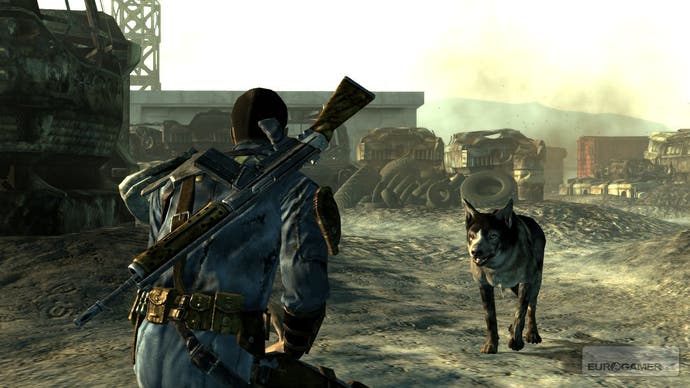
This is all rather concerning, but so much of Fallout's success is tied to other things, such as the manner in which the game draws you into its characters' lives, and the quality of side quests for which Bethesda is famous. So, on our recent trip out of the vault, we headed not for combat on the shattered highway leading to DC, but towards the patchwork, rusting, and gantry-heavy community of Megaton - a shanty-town built around an unexploded nuclear warhead - to lay down our guns and spend an hour chatting, before taking off on a quest or two.
Bad news first: when it comes to dialogue, Fallout 3 remains something of a stubborn throwback, unwilling to step away from traditional one-on-one interrogation mechanics and explore the new possibilities of a post-Mass Effect world. With no hint of radial selection or keyword attitude choices which seemed likely to become the RPG's version on Halo's rechargeable shield - a genre standard by virtue of near-unanimous theft - instead, a quick introductory conversation with the mayor of Megaton reveals that Fallout 3 is sticking with a system largely unchanged from the days of Monkey Island.
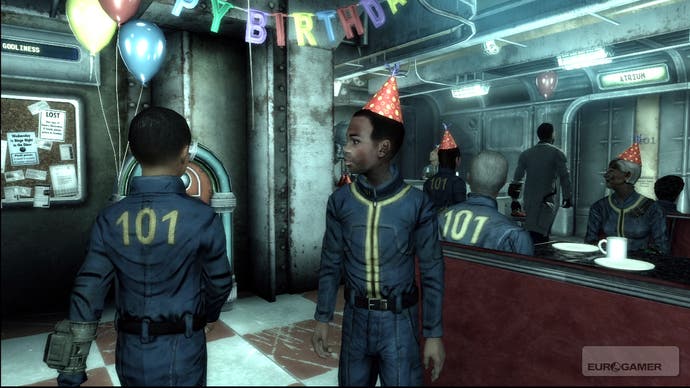
In other words, there's a selection of detailed conversation starters giving way to a deep tangle of dialogue trees. While these trees are impressively large, and the dialogue itself is fairly snappy and pretty good at providing a sense of individual character when the voice acting stumbles, the system remains oddly basic given the pleasant surprises Mass Effect was constantly delivering in the way your quick choices actually played out. There's nothing broken about Fallout 3's system, it's just no longer the best one available.
And the wider presentation method doesn't help: the mayor may be an engaging character, ragged yet proud, and quickly revealed as a canny pragmatist, but the disconcerting head-on view taken directly from Oblivion, along with the limited animation, means these things have to be conveyed mainly by the written word. Equally, what we've seen of the game's Karma system suggests that Bethesda's determination not to wrong-foot or confuse its players has lead to a moral compass that's black and white and a little heavy-handed.


